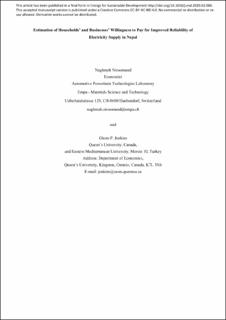Please use this identifier to cite or link to this item:
https://doi.org/10.21256/zhaw-25600| Publication type: | Article in scientific journal |
| Type of review: | Peer review (publication) |
| Title: | Estimation of households' and businesses' willingness to pay for improved reliability of electricity supply in Nepal |
| Authors: | Niroomand, Naghmeh Jenkins, Glenn P. |
| et. al: | No |
| DOI: | 10.1016/j.esd.2020.02.006 10.21256/zhaw-25600 |
| Published in: | Energy for Sustainable Development |
| Volume(Issue): | 55 |
| Page(s): | 201 |
| Pages to: | 209 |
| Issue Date: | 2020 |
| Publisher / Ed. Institution: | Elsevier |
| ISSN: | 0973-0826 2352-4669 |
| Language: | English |
| Subjects: | Contingent valuation; Electricity; Logit model; Non-parametric method; Willingness to pay |
| Subject (DDC): | 333.79: Energy |
| Abstract: | For the decade prior to 2016 Nepal suffered fromtheworst electricity shortages in South Asia. During this period load shedding occurred for up to 18 h a day when hydropower generation is low. This research uses parametric and non-parametric models to estimate households' and businesses' willingness to pay (WTP) for improved reliability of electricity services in Nepal. A contingent valuation (CV) survey was completed by 1800 households and 590 businesses. The parametric models are estimated using Logit regressions. The non- parametric estimations include the median, Turnbull and the Kriström mean estimations that are estimated directly from the survey results. In all estimations of theWTP the households and businesses arewilling to pay more to get froma 50% reduction to a complete elimination of outages than they arewilling to pay to get fromtheir current situation to a 50% reduction in outages. This difference in the estimates of theWTP for these two options is even more important in the case of businesses than for households. In the cost- benefit analysis that uses these results the annual benefit in 2017 from improving the reliability of the electricity service would be approximately US$ 324 million with a present value over 20 years of between US$ 2 and 3.8 billion. |
| URI: | https://digitalcollection.zhaw.ch/handle/11475/25600 |
| Fulltext version: | Accepted version |
| License (according to publishing contract): | CC BY-NC-ND 4.0: Attribution - Non commercial - No derivatives 4.0 International |
| Departement: | School of Management and Law |
| Organisational Unit: | Center for Labor, Digital and Regional Economics (CLDR) |
| Appears in collections: | Publikationen School of Management and Law |
Files in This Item:
| File | Description | Size | Format | |
|---|---|---|---|---|
| 2020_Niroomand-Jenkins_Estimation-households-businesses-willingness-pay-electricity-Nepal.pdf | accepted version | 524.38 kB | Adobe PDF |  View/Open |
Show full item record
Niroomand, N., & Jenkins, G. P. (2020). Estimation of households’ and businesses’ willingness to pay for improved reliability of electricity supply in Nepal. Energy for Sustainable Development, 55, 201–209. https://doi.org/10.1016/j.esd.2020.02.006
Niroomand, N. and Jenkins, G.P. (2020) ‘Estimation of households” and businesses” willingness to pay for improved reliability of electricity supply in Nepal’, Energy for Sustainable Development, 55, pp. 201–209. Available at: https://doi.org/10.1016/j.esd.2020.02.006.
N. Niroomand and G. P. Jenkins, “Estimation of households’ and businesses’ willingness to pay for improved reliability of electricity supply in Nepal,” Energy for Sustainable Development, vol. 55, pp. 201–209, 2020, doi: 10.1016/j.esd.2020.02.006.
NIROOMAND, Naghmeh und Glenn P. JENKINS, 2020. Estimation of households‘ and businesses‘ willingness to pay for improved reliability of electricity supply in Nepal. Energy for Sustainable Development. 2020. Bd. 55, S. 201–209. DOI 10.1016/j.esd.2020.02.006
Niroomand, Naghmeh, and Glenn P. Jenkins. 2020. “Estimation of Households’ and Businesses’ Willingness to Pay for Improved Reliability of Electricity Supply in Nepal.” Energy for Sustainable Development 55: 201–9. https://doi.org/10.1016/j.esd.2020.02.006.
Niroomand, Naghmeh, and Glenn P. Jenkins. “Estimation of Households’ and Businesses’ Willingness to Pay for Improved Reliability of Electricity Supply in Nepal.” Energy for Sustainable Development, vol. 55, 2020, pp. 201–9, https://doi.org/10.1016/j.esd.2020.02.006.
Items in DSpace are protected by copyright, with all rights reserved, unless otherwise indicated.